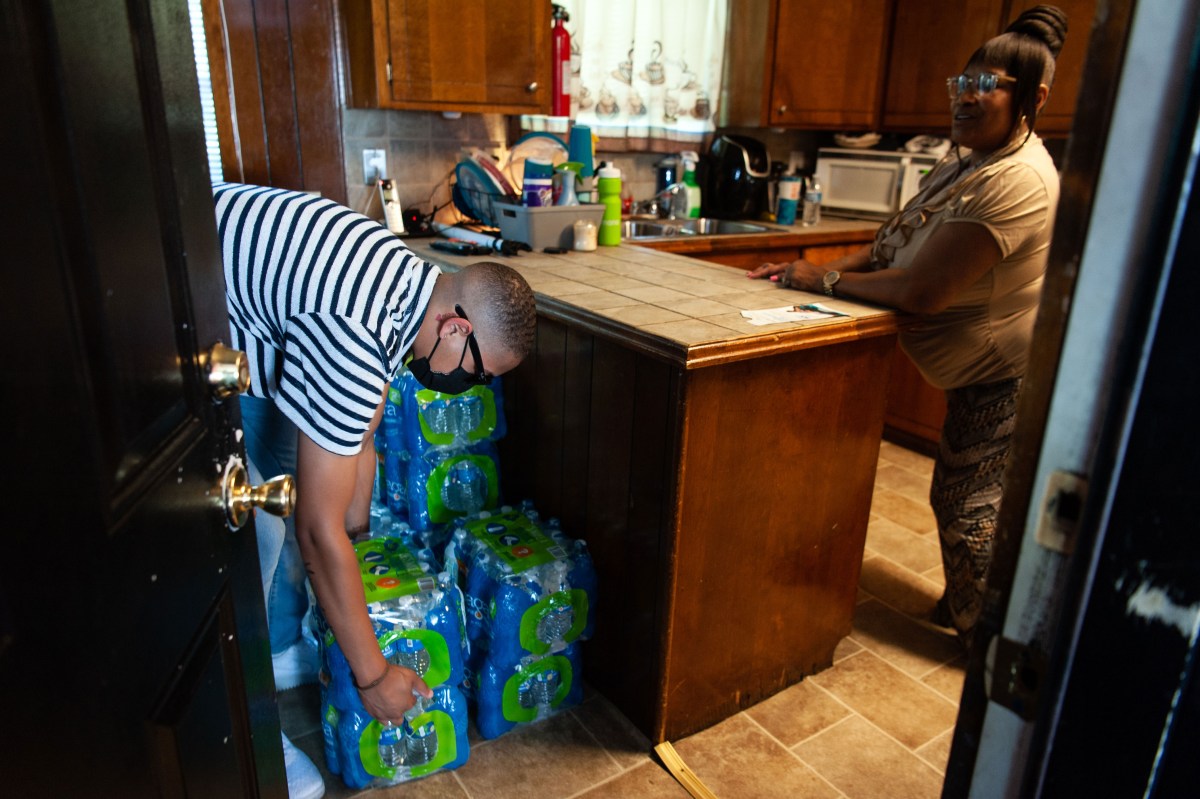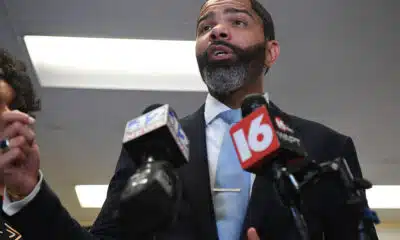Mississippi News
JSU: Jackson water crisis highlights limitation of government
‘The wall people are running into’: For JSU student, city water crisis highlights limitation of government
Maisie Brown pulled her aunt’s army green Ford Edge onto I-55, heading north past the port-a-potties outside the Hilton on County Line Road.
The Jackson State University junior was on a mission last Wednesday – two days after Gov. Tate Reeves declared a water emergency in Jackson – to deliver water to elderly and disabled people in the capital city. Her first stop was Academy Sports and Outdoors, a retailer in the plush city of Madison, to pick up nearly two dozen 24-packs of bottled water.
That Brown had to trek outside the city limits to buy water is indicative of one of the many systemic issues at the heart of Jackson’s water crisis: The whiter, wealthier suburbs – recipients of population growth post-integration – aren’t dealing with the same crisis today.
“People look down on Jackson, but give it a decade,” Brown said before applying a light-pink shade of Victoria’s Secret lip gloss. “This is going to be everyone’s reality soon.”
Like most people from the Jackson-metro area, Brown was rarely fazed by the city’s boil water notices, as typical as the crater-like potholes. The 22-year-old grew up seeing stacks of plastic water jugs in her grandparents’ house off State Street – “not because they like to drink water like a fish,” she said, “but sometimes you never know when it’s going to be on the news and they tell you to boil water.”
But Brown’s attitude changed on Aug. 29, when Reeves announced in an evening press conference that the city would be without clean, running water “indefinitely.” The pressure had dropped so low that many of Jackson’s 150,000 residents weren’t receiving water at all.
In the coming days, the Mississippi National Guard would be staffing water distribution sites across the city – but getting there would require a car, a significant barrier in a state that has one of the lowest rates of car ownership in the country.
That night, Brown realized it was unclear how, if at all, the state was planning to bring water to elderly and disabled folks who wouldn’t be able to drive to the distribution sites. So the student activist, known for her role in helping to coordinate the city’s largest protest since the civil rights movement, decided it was time to mobilize. She posted a call-out on social media for volunteers to help her deliver water.
“The state has consistently ignored Jackson’s asks for help,” she said. “We are not high-priority for the people in power, because of the Black, poverty-stricken population that we are.”
Within 24 hours, Brown raised over nearly $2,500 (it’s more than $6,000 now) and assembled more than 20 JSU students to start the “MS Student Water Crisis Advocacy Team.” Together, they’ve delivered about 1,000 cases of water to more than 200 homes, organizing drop-offs via a shared spreadsheet.

Brown’s iPhone hasn’t stopped ringing since. That Wednesday morning, she got 14 calls: A Mississippi Emergency Management Agency representative asked if she could include Brown’s number on a list of water distribution resources; a stranger requested a delivery for a friend with multiple sclerosis; several journalists from national media reached out for an interview.
Most calls were from Jacksonians who couldn’t get to the city and state distribution sites. Whether they offered an explanation or not, Brown delivered water.
“If the government could do everything, then there’d be no nonprofit or grassroots organizations,” she said. “The whole structure of government, the way it’s built today, is not enough to help people. That’s the wall people are running into.”
As Brown exited I-55, a 917 area code popped up on the Ford Edge’s dashboard.
“Who is this from New York calling me?” Brown said.
It was a producer from CNN – the first of five media calls Brown would receive that day on the temporary number she had created for the hotline. Before the producer could finish pitching Brown on a segment, she was interrupted by a Jacksonian who called the hotline for a water delivery. (Brown got so many calls from reporters last week that she had to post on Twitter asking them not to use the hotline.)
“This is my phone all day long,” Brown said when she hung up.
A few minutes later, she pulled into the shopping plaza where Academy was located and checked her phone, hoping they wouldn’t cancel her order like the Walmart in Byram had the day before.
Brown spotted two Academy workers wheeling cases of water on a blue platform dolly. She hopped out of the car to greet them, then popped the trunk. One of the workers stared at it for a second and frowned.
“I know y’all are probably like who the f— is ordering 20 packs of water?” Brown said jokingly.
“No, I get it,” he replied. “Y’all are good.”
For Brown, a political science major, the water emergency has sparked big-picture questions about the role of government in a democratic society and who it really serves. The one-party state government doesn’t serve everyone in Mississippi, Brown said, because it was not elected by everyone. Black Mississippians, more likely to vote Democratic, are also disenfranchised at higher rates than white people.
“We’re a red state, but we’re a Black state too,” Brown said. “People forget that part.”
This perspective has led Brown to push for change on an array of systemic issues in Mississippi, including the state flag that held the Confederate battle emblem, the “pink tax” on menstrual products, and the disproportionate impact of abortion bans on Black and low-income people.
Brown said she views this work as a way of building a better world – an outlook she adopted after reading the “Faces at the Bottom of the Well,” a book by Derrick Bell.
“The work you’re doing is not in vain, but will be a model for a new society – a better one,” Brown said, paraphrasing the introduction by the lawyer Michelle Alexander. “That keeps me motivated.”
On her way back from Madison, Brown stopped at her first drop-off, an orange-and-red apartment complex behind a car dealership on South Frontage Road. Two young men helped Brown carry the 29-lb packs of water cases to the front door.
Then it was off to west Jackson, where Brown had two stops to make. The first was at a house with red trim on Maple Street near Lanier High School, the first high school built for Black kids in Jackson. The woman who lived there wasn’t home but worried someone might take the water cases, so she asked Brown to leave them behind the bushes next to her doorstep.
Even though Brown is from Madison, she’s well acquainted with this part of the city – her dad’s side of the family used to own a restaurant here, but now it’s boarded up. Brown also went to school in the city, because her dad is a principal in Jackson’s school district. On the weekends, he’d go to block parties to meet the community, and she’d tag along.
“It’s very rare that people who don’t live in Jackson try to go to school here,” she said. “It’s always the opposite way.”
Indeed, the phenomenon that Brown is getting at – white flight – is another contributing factor to Jackson’s water crisis. The overgrown bushes and derelict buildings in west Jackson are an above-ground symptom of the billions in lost tax dollars as 71% of white residents have left since 1980. Beneath the city, the water lines are deteriorating just the same.

The temperature was starting to get hot and muggy. Outside the yellow duplex where Brown made her next delivery, a man was blowing cut grass off the sidewalk. Brown thought about delivering water to the next-door neighbor, but decided against it – a pitbull, panting in front of a silver water bowl, guarded the porch.
As Brown turned to leave, he asked if she had enough cases for the neighboring house – if so, he’d call the man who lived there to ask.
“How long y’all doing the water?” he asked.
“As long as the money comes in to keep doing more,” she replied.
Brown’s last stop for the day was in North Jackson at a red brick house in a subdivision near Hope Spring Missionary Baptist Church, one of the oldest churches in Jackson, established in 1865 to serve freed slaves. A woman answered the door, revealing a large painting of a white, fluffy cat in the dim entryway.
“You brought me some water,” she remarked. “I didn’t have any water. Thank you.”
Sitting in her car in the woman’s driveway, Brown took a moment to pause. She turned up the volume on “America Has a Problem,” her favorite song from Beyonce’s latest album, and thought about preparing for a TV interview that night.
“Alright,” she said, “let me figure out some things while I’m at a stopping point.”
Then her phone rang.
The images in this story are from Deep Indigo Collective, a visual storytelling resource supporting news outlets reporting on the local impacts of environmental threats and the climate crisis. As a 501(c)(3) organization, Deep Indigo is proud to produce original visual journalism on behalf of our editorial partners across the United States.
This article first appeared on Mississippi Today and is republished here under a Creative Commons license.
Mississippi News
LIVE: Sean ‘Diddy’ Combs guilty of prostitution-related offense
SUMMARY: Sean “Diddy” Combs was found guilty on two counts of transportation to engage in prostitution but acquitted of racketeering and sex trafficking charges after a seven-week trial. The jury convicted him of flying people, including girlfriends and paid sex workers, across the country for sexual encounters, violating the federal Mann Act. However, they did not find sufficient evidence for racketeering conspiracy or sex trafficking. The prosecution portrayed Combs as the head of a criminal enterprise exploiting women, while the defense argued the women were consenting adults and the charges exaggerated his lifestyle. The trial included testimonies from former partners and lasted 13 hours of jury deliberation.
The post LIVE: Sean 'Diddy' Combs guilty of prostitution-related offense appeared first on www.wjtv.com
Mississippi News
Defendant in Mississippi auditor’s ‘second largest’ embezzlement case in history goes free
SUMMARY: Four years ago, Tunica nonprofit operator Mardis Jones was arrested for allegedly embezzling over $1 million from a county home rehabilitation program funded by casino revenue. The state auditor accused Jones of misusing funds meant to help vulnerable residents, claiming little money reached contractors. Jones’ defense cited poor program administration and insufficient evidence of theft, with a jury ultimately acquitting him last month. Despite the criminal acquittal, the auditor’s office demanded repayment through a civil claim, which the attorney general’s office had yet to act on, but recently confirmed receipt of the demand letter. The case highlights issues in government oversight and program management.
The post Defendant in Mississippi auditor’s ‘second largest’ embezzlement case in history goes free appeared first on www.wjtv.com
Mississippi News
Events happening this weekend in Mississippi: June 27-29
SUMMARY: This weekend (June 27-29) in Mississippi offers a variety of events across the state. Central Mississippi hosts the Kiwanis Club of Pearl Golf Tournament, multiple hot air balloon events including the Mississippi Championship Hot Air Balloon Festival in Canton, and exhibitions like Hurricane Katrina: Mississippi Remembers in Jackson. There are also family-friendly activities such as Guys and Dolls Jr. in Natchez, Pilates and yoga events in Jackson, and farmers markets in Jackson, Natchez, and Vicksburg. The Pine Belt region features Story Time with a Soldier in Hattiesburg, immersive theater experiences, karaoke, and runs supporting recovery programs in Laurel.
The post Events happening this weekend in Mississippi: June 27-29 appeared first on www.wjtv.com
-
Mississippi Today7 days ago
Defendant in auditor’s ‘second largest’ embezzlement case in history goes free
-
News from the South - Georgia News Feed6 days ago
Are you addicted to ‘fridge cigarettes’? Here’s what the Gen Z term means
-
The Conversation6 days ago
Toxic algae blooms are lasting longer than before in Lake Erie − why that’s a worry for people and pets
-
News from the South - Tennessee News Feed6 days ago
5 teen boys caught on video using two stolen cars during crash-and-grab at Memphis gas station
-
Local News6 days ago
St. Martin trio becomes the first females in Mississippi to sign Flag Football Scholarships
-
Local News7 days ago
Mississippi Power shares resources and tips for lowering energy bill in the summer
-
News from the South - Kentucky News Feed7 days ago
Error that caused Medicaid denials has been corrected, says cabinet in response to auditor letter
-
News from the South - Georgia News Feed7 days ago
GOP mega-bill stuck in US Senate as disputes grow over hospitals and more















































